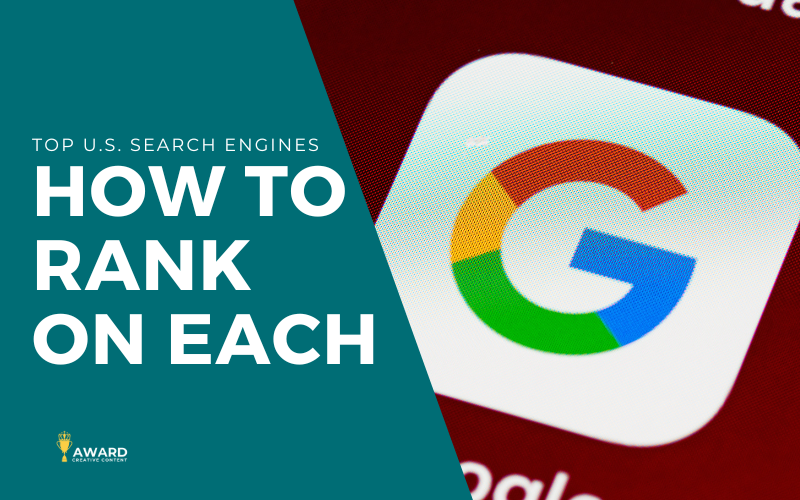Search engine optimization (SEO) is no longer confined to just web search engines; it spans a range of platforms where businesses need visibility. Marketers, sales teams, and executives must consider how SEO principles apply not only to Google, but also to social media algorithms, local searches, e-commerce marketplaces, and more.

Top Internet Search Engines in the U.S.
The foundation of SEO is optimizing for search engines. In the United States, three search engines account for the vast majority of queries: Google, Bing, and DuckDuckGo.
Google (US and Global Leader)
Market Share & Importance: Google is the dominant search engine, handling close to 90% of all search queries worldwide. In the U.S., Google’s share is about 88%, and it has rarely dipped below 90% globally in the past decade. This massive lead means Google largely sets the standards for SEO—most businesses prioritize Google in their SEO efforts.
Google Ranking Factors
Google uses a complex algorithm with hundreds of ranking signals to deliver relevant results. Key factors include high-quality, original content that demonstrates expertise and trustworthiness, a strong backlink profile, and solid technical performance (fast loading speed, mobile-friendly design, proper indexing).
Google’s advances in semantic understanding mean it can interpret user intent and context. That means that simply matching keywords is not enough in today’s space.
Instead, Google rewards pages that best address/answer a query. Who’s best is often measured by engagement and content depth. Google SEO also emphasizes user experience, evident in updates that prioritize mobile-first indexing and Core Web Vitals (page speed, interactivity, stability).
In practice, this means businesses should publish authoritative content, earn credible backlinks, and ensure their sites are technically sound. Google’s algorithm updates often attempt to prioritize helpful content and spam updates, continually refining what it considers a “quality” result.
Google SEO Best Practices
Marketers should follow Google’s Search Essentials (formerly Webmaster Guidelines). Best practices include:
- Using descriptive page titles and headers with relevant keywords
- Structure content clearly
- Implement structured data where appropriate (e.g. FAQ snippets, reviews).
Considering Google’s E-E-A-T (Experience, Expertise, Authoritativeness, Trustworthiness) principles, creating content that reflects genuine expertise and updating websites to build authority is paramount. And, earning backlinks from reputable sites remains a cornerstone SEO tactic for Google.
In short, to rank well on Google, businesses should deliver the most relevant, trustworthy answer to users’ queries and ensure their site offers a seamless experience.
Bing (Microsoft’s Search Engine)
Bing is the second-largest search engine in the U.S., though it trails far behind Google. It holds roughly 7–8% of the U.S. market and around 3–4% globally. Notably, Bing’s share has seen slight growth recently, partly due to new features like AI-powered search integration. In early 2023, Microsoft integrated OpenAI’s GPT into Bing, introducing a chat-based search alongside traditional results.
While Google continues to dominate search, Bing’s innovations have drawn attention and could perhaps incrementally increase its user base. Another strength for the brand: it’s search results fuel Yahoo’s search engine–a former search leader who now holds roughly 1-3% of the U.S. market.
Bing Ranking Factors
Bing’s core ranking factors are similar to Google’s – content relevance, backlinks, and technical SEO. However, their weighting can be different.
Bing tends to place more emphasis on on-page keywords and metadata. For example, having the exact keyword in the page title, headings, and even meta description can have a stronger influence on Bing rankings than on Google. Essentially, it’s what worked on Google years ago but became less effective as the focus on quality content increased over time.
Bing is also more transparent about some ranking signals. While Google is often evasive in its specifics, Bing has in the past confirmed that social signals (e.g. Facebook likes, Twitter shares) can positively influence rankings–a departure from Google. However, the company began walking that metric’s impact back by 2017.
Additionally, Bing values multimedia content–a long-standing practice that continues to factor in its rankings. Websites that incorporate rich media (images, videos) with proper optimization tend to perform better on Bing.
Backlinks are important on Bing as well. Unlike Google, reports suggest Bing may be less stringent than Google about the ultra-high authority links. The platform is believed to play a heavy factor in search results for another regularly used U.S. search engine we’ll discuss in just a moment.
Bing Best Practices
Businesses should ensure traditional on-page SEO elements are well-tuned for Bing search. Factors include:
- Target keywords in titles, headings, and meta descriptions
- Structured data and clear formatting to help Bing interpret content
- Promoting content on social media to drive engagement (an old-era tactic that may still have some impact on results, but not a top metric to consider anymore)
It also tends to help submitting a site page to Bing Webmaster Tools for indexing and insights, much like Google Search Console. Be on the lookout, Webmaster Tools has a noted history of going down for prolonged periods at times.
Overall, optimizing for Google generally covers a lot of Bing’s requirements. However, Bing tends to hold onto some standout metrics, including older-era Google practices. Some have also suggested that Bing prefers longtail keywords. So, consider fitting key terms into site copy, but it may risk the overall user experience. Weigh the risk-reward before publishing and indexing.
DuckDuckGo
DuckDuckGo’s global search market share has grown from virtually zero in 2010s to around 0.6–0.8% in recent years. As of early 2025, it holds an approximate .66% market share globally. While far from Google in dominance, DuckDuckGo punches above its weight in the U.S., where it accounts for roughly 2–3% of search queries, and hold a small bit of the market share in nations like Germany as well.
Considered America’s third or fourth most used search engine today, the platform’s query volume serves over three billion searches per month and has an estimated 46+ million users worldwide.
DuckDuckGo’s value prop is in its privacy settings. Most users choose it specifically to avoid tracking, a known factor in Google or Bing. Unlike those engines, DuckDuckGo does not track personal data (no search history, no personalized ads, no unique user profiling). This privacy-first approach appeals to users seeking search anonymity and security, often attracting searches from sensitive fields sectors, like law, finance, and healthcare. Interestingly enough, DuckDuckGo’s users tend to be highly affluent, with over 60% having incomes above $100k in the U.S.
DuckDuckGo Ranking Factors
DuckDuckGo’s search results use hybrid of sources, with significant emphasis on Bing’s index and algorithm. Unlike Yahoo, the engine operates its own crawler, DuckDuckBot. However, it is reported to lean heavily on Bing for search results. In addition to Bing, DDG uses over 400+ third-party sources like Yahoo, Wikipedia, and Wolfram|Alpha for instant answers.
In some ways, DuckDuckGo’s core ranking signals resemble Bing’s. Factors such as keyword relevance, on-page content, and backlinks all play a role similar on both platforms. Further, DuckDuckGo has confirmed that it values authoritative backlinks, think E-E-A-T.
And like Google and Bing, content quality and relevance remain foundational on DuckDuckGo. That means, pages still need to match the query intent and offer useful, crawlable content to rank.
That said, DuckDuckGo’s privacy orientation makes its rankings stand out. Unlike Google and Bing, DuckDuckGo does not use personalization or behavioral targeting–a/k/a it doesn’t tailor results. That said, the customization has led some to report less satisfaction with results compared to the other major U.S. search players.
Privacy settings also impact core ranking metrics. DuckDuckGo doesn’t track click behavior on a personal level. As such, user engagement signals like click-through rate or dwell times are not directly factored into ranking in the way Google is believed to operate.
With user engagement signals unfactored, more emphasis falls on traditional SEO signals, including:
- Page content
- Metadata
- Links
- Technical site health.
Overall, if your site is well-optimized for Bing’s algorithm, then it should perform well on DuckDuckGo.
DuckDuckGo SEO Best Practices
Optimize for DuckDuckGo by leaning into fundamental SEO and Bing-focused tactics. Key strategies for success on DuckDuckGo:
- On-page keyword optimization and content
- Build quality backlinks from authoritative, relevant sites
- Use structured data schema (Helpful for DuckDuckGo’s Instant Answers)
- Index pages using Bing
DuckDuckGo is likely to remain a small but significant player in search. It won’t dethrone Google anytime soon, but it serves an important segment that is only growing as consumers become more conscious of data privacy. As regulations and public sentiment continue favoring privacy, DuckDuckGo’s principled stance could win it new default placements or users.
Know Your Search Engines
Google no doubt remains the top search engine in America and much of the world. But that isn’t the only place people are searching. By optimizing for Bing, DuckDuckGo and even Yahoo, brands have a chance of generating more audience awareness and business. While the search traffic of those Bing-driven engines isn’t comparable to Google, they still generate billions in queries—and what business doesn’t want to be seen?
More helpful seo tips from award cc
Looking for more insights on how to power your brand’s SEO strategy in 2025? Check out some of these recent blogs from AWARD:
- How Does SEO Work?
- Is SEO Dead?
- SEO Optimization: How Trends, AI & More Impact Strategy
- How Long Does It Take to Rank on Google?
- Cannabis Search Engine Marketing: Is It Feasible?
- SEO for Cannabis Brands
Want some help optimizing your brand or website? Contact AWARD Creative Content today. We have over 10 years experience optimizing and creating content for various industries, including YMYL sectors like cannabis.




